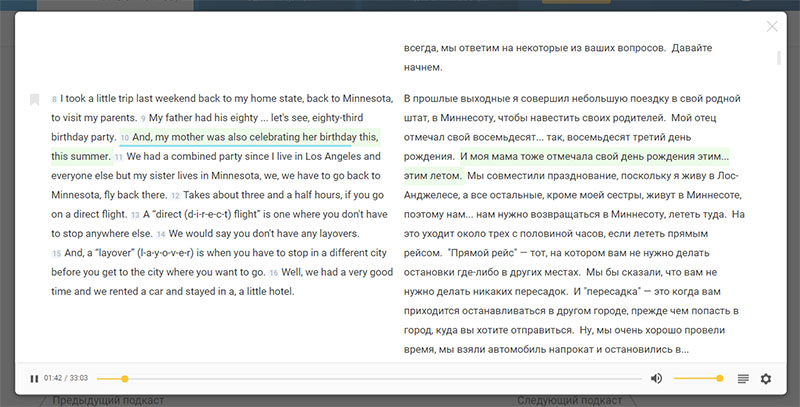
What is the American English pronunciation podcast?
The American English Pronunciation Podcast teaches every aspect of English pronunciation, including sound production, syllable stress, English intonation patterns, and spoken rhythm.
What is RP (Received Pronunciation)?
Received pronunciation, or RP, refers to an accent in English regarded by many people as a ‘standard' accent. It has also been called ‘the Queen's English' or ‘BBC English'. In the past, RP had high status in the UK, indicating an educated speaker, and this transferred into EFL where it has been used as a model for pronunciation.
Where can I find the transcripts for pronuncian episodes?
If you want to read those sentences as you say them, you can find the transcripts for this episode by going to www.pronuncian.com and clicking on "Podcasts." Then click episode 204. Also, don't forget about our Pronuncian Facebook page: www.facebook.com/pronuncian.
Where can I learn pronuncian?
If you want to support Pronuncian.com and this podcast, you can buy yourself a copy of Pronunciation Pages 2 which includes lessons, exercises and sound drills for both of these sounds, (and all the other sounds of English, of course) or you can buy the Sound Drills which include just the practice lists for all of the sounds of English.

Is Received Pronunciation dying out?
People often talk about the English language as if it is a thing to keep pretty – a petticoat that might be sullied by the spread of glottal stops, text-speak or slang.
Is Received Pronunciation posh?
There is one notable absentee from this list – colloquially termed 'posh'. Technically this accent is known as 'Upper Received Pronunciation' and is widely associated with the English aristocracy and educational institutions such as Eton and Oxford.
Who speaks with Received Pronunciation?
British Received Pronunciation (RP), traditionally defined as the standard speech used in London and southeastern England, is one of many forms (or accents) of standard speech throughout the English-speaking world. Other pronunciations, although not standard, are often heard in the public domain.
Is Received Pronunciation the same as standard English?
RP is an accent, not a dialect, since all RP speakers speak Standard English. In other words, they avoid non-standard grammatical constructions and localised vocabulary characteristic of regional dialects. RP is also regionally non-specific, that is it does not contain any clues about a speaker's geographic background.
Does the queen speak RP?
Anyone who has heard the Queen's speeches will recognise her distinctive British accent. This is RP – 'Received Pronunciation'. This year, Her Majesty The Queen will become the first British Monarch to celebrate a Platinum Jubilee after 70 years of service.
What is the poshest English accent?
RP English is said to sound posh and powerful, whereas people who speak Cockney English, the accent of working-class Londoners, often experience prejudice. The Birmingham accent fares even worse – which the result of TV shows which depicted its residents as “slow, lazy and thick”, researchers wrote.
What is the Queen's accent called?
Received PronunciationVariously referred to as the 'Queen's English', 'BBC English' or 'Oxford English', Received Pronunciation, or RP for short, is the accent usually described as typically British. Find out more about its origins and its current status in the UK.
What accent does Emma Watson have?
British accentFor Harry Potter's fans and fans of Emma Watson this is a video all about her beautiful British accent. She speaks with received pronunciation or contemporary RP as it's commonly known.
How do I learn RP?
0:021:57How To Do An RP/British Accent In UNDER TWO MINUTES - YouTubeYouTubeStart of suggested clipEnd of suggested clipYou have bath instead of palm you have palm instead of class you have class very classy makes youMoreYou have bath instead of palm you have palm instead of class you have class very classy makes you have the off. Sounds them instead of hot you have hot instead of class you have cloth.
Why is Received Pronunciation so called?
The term Received Pronunciation was popularized by Daniel Jones in his 1926 edition of the English Pronouncing Dictionary. Rather than meaning given, Received Pronunciation refers to the fact that it is the approved or standard pronunciation.
Why is Received Pronunciation is so important?
Function and Social Importance of RP As mentioned before, speakers of RP are historically connected with a higher social status and even nowadays “research has shown that RP has a high rating as being pleasing, articulate and prestigious” (ibid. 124).
What is a neutral RP accent?
Received Pronunciation (RP) is the proper term to describe the regionally neutral accent used by many middle-class speakers in the UK, particularly in England. It is widely used as a reference point in dictionaries and as a model for teaching English as a foreign language.
How do you sound posh?
If you want to learn how to sound posh like the British monarch, follow Larkin's five key instructions:Clearly pronounce the letter H at the beginning of words such as "hat" and "hamper."Don't pronounce the R in a word unless it proceeds a vowel. ... Make your vowels longer. ... Emphasize the letter T.More items...•
How do British speak posh?
2:1310:46How to Speak Like a POSH BRITISH Person - YouTubeYouTubeStart of suggested clipEnd of suggested clipTurn off the television. Let's hear Queen he said and you can't look down to read the speech youMoreTurn off the television. Let's hear Queen he said and you can't look down to read the speech you have to take the speech. Up. Because if you did your neck would break. For off ah perfection.
What accent does Emma Watson have?
British accentFor Harry Potter's fans and fans of Emma Watson this is a video all about her beautiful British accent. She speaks with received pronunciation or contemporary RP as it's commonly known.
Why Received Pronunciation is so important?
Function and Social Importance of RP As mentioned before, speakers of RP are historically connected with a higher social status and even nowadays “research has shown that RP has a high rating as being pleasing, articulate and prestigious” (ibid.
What does RP mean in English?
Now if you’ve not heard of it before, ‘Received Pronunciation’ or RP as it’s shortened to, is defined at the ‘standard English, which is spoken in southern Britain’. But actually Received Pronunciation is spoken by only around 2 or 3% of the British population. So what it’s come to mean is a rather upper class accent. People are more likely to speak in this way, if they come from the south of England and if they have come from a family with money, a family who’re well-off, upper class.
Who is the actress with a Liverpool accent?
You remember we listened to Jodie Comer for a Liverpool accent, a couple of weeks ago? So this is the actress Joanna Lumley. She’s very well-loved in the UK and she’s known for having a beautifully ‘Received Pronunciation’ Accent. Here she is to help you learn British accent.
What accent does Joanna Lumley speak?
Vocabulary for the snippet of Joanna Lumley. So that’s Joanna Lumley speaking in her RP accent. Just a bit of vocabulary. She’s explaining the project. So it’s a project to take bits of the series, Blue Planet II and put it to music.
What type of accent do you speak in England?
We mostly speak the TV or Film type English accent, you might be familiar with, in the South of England.
Is there an accent in Britain?
So let’s start by saying There is no British accent. That may sound confusing but if you think about it, Britain is actually a collection of countries; England, Scotland, Wales, Northern Ireland. The people of these countries all speak English differently.
Do British people have an accent?
I think the confusion comes from the common perception that British people sound more like the TV and Film stars you might see and hear if you live outside of Britain. Most of the British people don’t have an English accent like Hugh Grant or speak like her royal highness the Queen or BBC news presenters.
What is perfect English podcast?
Imperfect English is an English learning podcast made by a non-native English speaker to help English learners just like you. Learn how to speak English better. Learn new English phrases. Practice your English pronunciation, intonation, and fluency.
What is all ears English?
Are you looking for a new and fun way to learn American English? Come hang out with Lindsay and Gabby from Boston and have fun while you improve your English listening skills! All Ears English is an English as a Second Language (ESL) podcast for intermediate to advanced learners around the world. Teachers Lindsay McMahon and Gabby Wallace will show you how to use everyday vocabulary and natural idioms, expressions, and phrasal verbs and how to make small talk in American English. We will als ...
Language Learning
English pronunciation and accent reduction podcast lessons for ESL students and professionals who want to speak the English language with a clear and confident American accent.
English Pronunciation Pod 20- How to Pronounce Long Words of Three or More Syllables
This podcast teaches you a method for accurately pronouncing long words with an American accent. .
English Pronunciation Pod 19- Vowel reduction in unstressed syllables
Today's podcast teaches you how to use the vowels /ə / and /I/ in unstressed syllables to make your accent sound more like an American's.
English Pronunciation Pod 18- Syllable Stress in Words of Three or More Syllables Part III
This podcast teaches another useful rule for determining the stress of words with three or more syllables.
English Pronunciation Pod 17- Syllable Stress in Words of Three or More Syllables Part II
This podcast continues to teach you how to determine the stress of words with three or more syllables.
English Pronunciation Pod 16- Syllable Stress in Words of Three or More Syllables
This podcast teaches you how to determine the stress of words with three or more syllables.
English Pronunciation Pod 15- Syllable Stress Continued
This podcast teaches you how to pronounce words which may have two different stress patterns.
